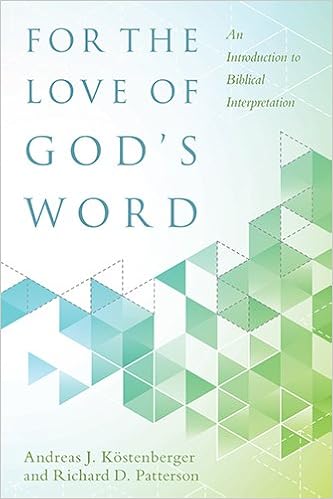
For
the Love of God’s Word by Andreas J. Kostenberger and
Richard D. Patterson
This abridgement to their Invitation to Biblical Interpretation entitled For the Love of God’s
Word is an excellent addition to the ever growing literature on hermeneutics. The focus in the book is outlining how the
triad of history, theology, and literature carefully considered help us in our
interpretive strategy for each book of the bible. Kostenberger and Patterson at the end of the
opening chapter write, “Thus sound interpretation becomes the solid foundation
for the application and proclamation of biblical truth to life (23).” Thus, the way toward solid application is in
the practice of sound interpretation moving from history, theology, and
literature of each biblical book.
The second chapter deals with the historical-cultural
background of the bible, namely looking at archaeology, cultural customs, and
the larger historical milieu that the testaments were written in. Attention is paid to kings surrounding the
writing of the prophets, the Maccabean and Hellenistic time periods, and archaeology
that has sustained what we find in the New Testament. What I find very compelling was the comments
surrounding the cultural custom of employing a kiss as a conventional greeting. Kostenberger mentions that, “we may find application
in today’s handshake or hug. In these
cases, we see to discern and apply the underlying principle involved in the
cultural expression (52).”
The chapter on Revelation was very good in that it
helps the reader understand the framework of apocalyptic as a genre but also
gives concrete clues for interpretation.
In seeking to understand the symbols in Revelation, the authors give us
a chart that deals with self-interpreted symbols. In other words, when we see phrases such as, “they
are,” “these are,” “which are,” and “stands for,” this should alert us to what
the symbol points toward.
The chapter on Parables helps the reader identify
various forms and techniques that Jesus uses in his teaching; overstatement,
hyperbole, pun, simile, metaphor, and questions. I really appreciated the way Kostenberger
filled out his definition of parables that teach a spiritual or moral lesson by
also adding, “When Jesus told a given parable, he aimed not merely at imparting
information but sought to effect a change in people’s perception and a reversal
in their values and world view (224).”
Overall, this abridgement is an excellent resource
and aid to those who want to soundly interpret the Scriptures.
Thanks to Kregel Academic for the copy of this book
in exchange for an honest review.
Comments
Post a Comment